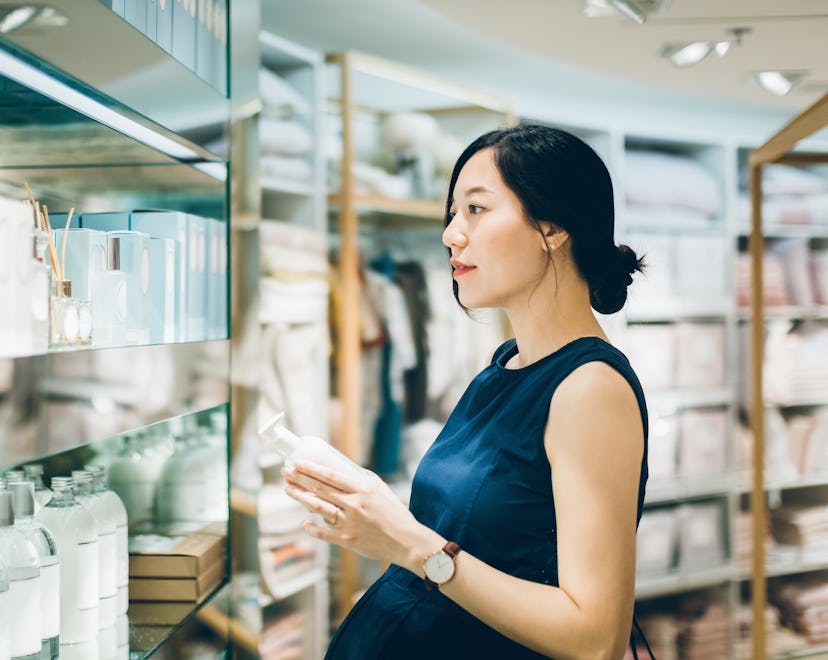New Routine Time

Pregnancy-Safe Skin Care: What To Use & Avoid According To Experts
What to shelve and what to shop for, explained.
When you’re pregnant, you have to be a little wary of, well, most things. While you’re learning which foods are safe and unsafe to eat, and which activities aren’t advised right now, you’ll want to check the ingredient lists on your favorite toner and moisturizer, too. Pregnancy-safe skin care products are formulated without certain ingredients that put developing fetuses at risk, and they tend to be on the gentle side since hormone changes during pregnancy can make your skin a little sensitive.
“During pregnancy, it’s important to be mindful of the skin care ingredients you use. Some ingredients can potentially cross the placenta and may pose risks to the developing fetus,” says Dr. Divya Shokeen, M.D., FAAD, board-certified dermatologist based in California. “Additionally, hormonal changes during pregnancy can make your skin more sensitive and reactive.”
“If I use this product, where is it going to go? A portion of it’s going to go though my skin to my bloodstream and my baby’s bloodstream. You have a shared circulation with your child, and any elements in your bloodstream can potentially be transferred to the baby,” says Dr. Jill Rabin, M.D., OB-GYN at Northwell Health and professor of obstetrics and gynecology at the Donald and Barbara Zucker School of Medicine at Hofstra/Northwell.
Ingredients to avoid
Rabin says there are limited studies on how ingredients in skin care affect fetuses, and what data does exist comes from animal studies, not human ones.
Shokeen and Rabin tell Romper that, from what we do know, these ingredients have been shown to have negative effects on developing fetuses, and should be avoided until after giving birth.
Retinoids & retinols
Let’s start with the big one: retinol, retinoids, all of the “retin” products need to go. “Prescription retinoids, such as isotretinoin and tretinoin, should be avoided as they have been associated with birth defects,” Shokeen says. “Over-the-counter retinol products are also best to be avoided due to the potential risk they may pose.”
“That’s a no-no in all caps, size 54 font,” Rabin says. “From human studies, we know that isotrentinoin, for example, can give you as much as a 30% or 40% risk of severe congenital anomalies. Up to 60% of children can have neurocognitive conditions from exposure to the retinoids in utero. That’s why we have people on birth control when they’re taking retinoids for acne. We want them to use two forms of contraception and be monitored by their obstetrician, and they need to be stopped at least two months, if not more, before trying to become pregnant.”
Salicylic acid
The National Institutes of Health (NIH) say there haven’t been any studies completed about the safety of salicylic acid use in pregnancy. So, better safe than sorry, experts say. “While low concentrations of salicylic acid in skin care products are generally considered safe, it’s best to avoid high concentrations or peels, as they can potentially be absorbed systemically,” says Shokeen.
Hydroquinone
As for this ingredient, the NIH says that while it doesn’t appear to be associated with any major birth defects or other risks, it is absorbed into the bloodstream at a much higher amount than other compounds. They say it’s “best to minimize exposure until further studies can confirm safety.”
“This skin-lightening ingredient is often used to treat hyperpigmentation, but its safety during pregnancy is uncertain and best avoided,” says Shokeen.
Formaldehyde
Formaldehyde exposure comes most often from nail polish, the NIH says, rather than a true skin care product. But when you’re thinking about pregnancy-safe makeup and cosmetics, keep this ingredient in mind and avoid it when you can. Formaldehyde “is of particular concern during pregnancy because of perinatal risk to the exposed fetus,” the health authority says.
“Found in some nail hardeners and hair straightening treatments, formaldehyde is best avoided due to potential toxicity concerns,” says Shokeen.
Phthalates
Rabin cites phthalates as a big no-no in pregnancy, and so do many medical authorities. The NIH and American College of Obstetrics and Gynecology (ACOG) advise limiting your phthalate exposure as much as possible during pregnancy because they are endocrine disruptors, and they have been associated with pre-term birth.
Ingredients that are safe
If you want to have zero doubts about the safety of your products, Rabin says less is more and encourages pregnant folks to pare down their skin care routine to the basics. Ingredients she says are safe in skin care and makeup during pregnancy include:
- Coconut oil
- Cocoa butter
- Glycolic acid (in a low percentage) and its relative, azelaic acid
- Vitamin E
- Topical reservatrol (it should not be taken orally during pregnancy)
- Hyaluronic acid
Experts have also told Romper that vitamin C and niacinamide are safe to use in pregnancy. When shopping for skin care products that are safe to use during pregnancy, Shokeen recommends, of course, looking for items labeled “pregnancy-safe” or “pregnancy-friendly.” She also suggests:
- Reading ingredient labels carefully. Avoid products containing ingredients that are known to pose potential risks during pregnancy.
- Sticking to mineral-based SPFs for sun protection, like those that contain zinc or titanium dioxide.
- Opting for gentle, soothing formulations. Look for products tailored to sensitive skin, since pregnant people often experience increased skin sensitivity.
And if you’re wondering, yes, Shokeen does have a few specific products she recommends for pregnant skin care lovers.
So, you may have to shelve your favorite serums and retinols for the next nine months, it’s true. But take this as an opportunity to try out some new products that are safe for you and your baby. Who knows? Maybe you’ll find a new Holy Grail.
Experts:
Dr. Divya Shokeen, M.D., FAAD, board-certified dermatologist based in California
Dr. Jill Rabin, M.D., OB-GYN at Northwell Health and professor of obstetrics and gynecology at the Donald and Barbara Zucker School of Medicine at Hofstra/Northwell
This article was originally published on